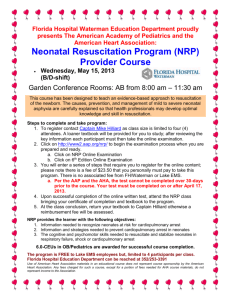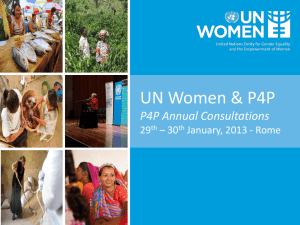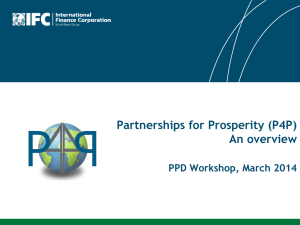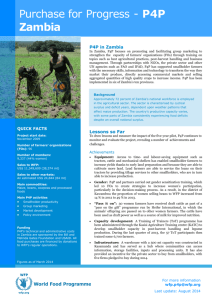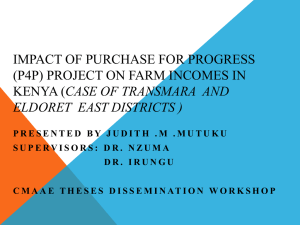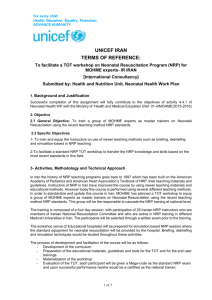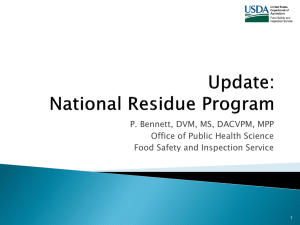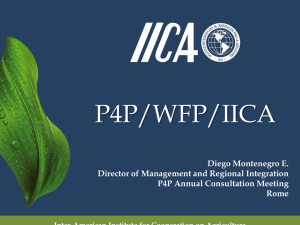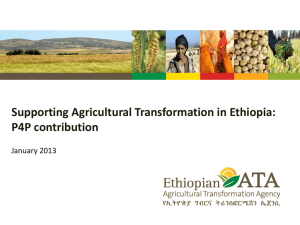P4P strategy
advertisement
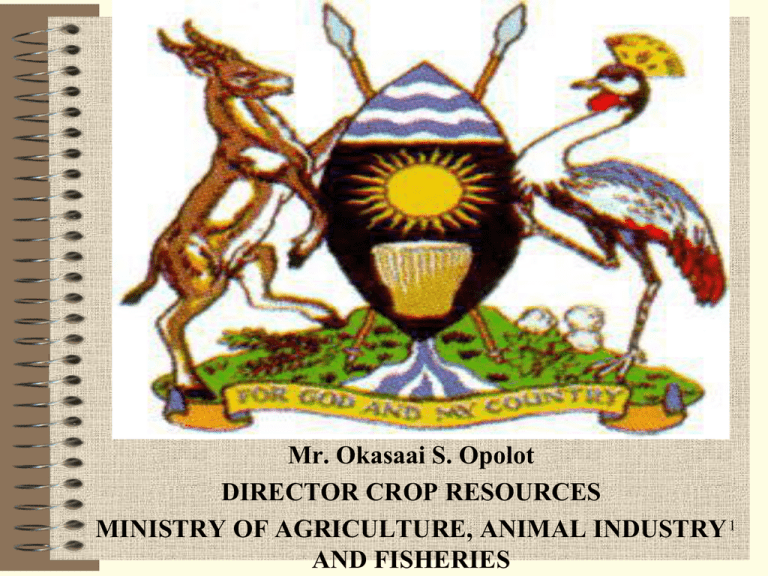
THE REPUBLIC OF UGANDA PRESENTATION ON P4P STRATEGY BY Mr. Okasaai S. Opolot DIRECTOR CROP RESOURCES MINISTRY OF AGRICULTURE, ANIMAL INDUSTRY 1 AND FISHERIES Background • The Uganda National Development Plan (NDP) vision is ''A transformed society from a peasant to a modern and prosperous country'', implying changing from a predominantly peasant low income to a middle income country. NDP's theme is ''Growth, Employment, and SocioEconomic Transformation for Prosperity" • 2 Background (cont’d) • The Agriculture Development Strategy Investment Plan (DSIP) is aligned with the NDP and is Uganda's implementation strategy for the CAADP Compact. • DSIP's vision is based on “A Competitive, Profitable and Sustainable Agricultural Sector 3 Background (cont’d) • The DSIP objectives inlcude: • Increased rural incomes & livelihoods, • Improved Household food & nutrition security, • Developed favourable legal, policy & institutional frameworks that facilitate private sector expansion and increased profitability along the entire value chain 4 Background (cont’d) • DSIP investments have been packaged under four Programmes: • Enhancing Production and Productivity, • Improving Access to Markets and Value Addition, • Creating an Enabling Environment and • Institutional Strengthening in the Sector. 5 How P4P is aligned to DSIP • Purchase for Progress (P4P) initiative is fully aligned to the DSIP • Implemented through the private sector providing the lead partnership • Partnership between Government & WFP is anchored on a Joint Action Agreement signed between the MAAIF, MTIC & WFP. 6 How P4P is aligned to DSIP (Cont’d) • P4P fully supports the agriculture sector DSIP which is an elaboration of the agriculture sector in NDP. It addresses: • Production and productivity • Value addition and access to markets for example through development of infrastructure (access roads, warehouses) and warehouse receipt systems. 7 How P4P is aligned to DSIP (Cont’d) • WFP is the largest single buyer of quality maize and accounts for 40-60% of the export maize in Uganda. • Development of farmer institutions • Supports commodity value chains for example: maize, beans • 8 P4P strategy • P4P implementation in Uganda is aligned to the NDP, the main framework for setting of the national development agenda. • P4P fully supports the agriculture sector DSIP which is an elaboration of the agriculture sector in NDP. • Activities supported by both the central & local governments with direct involvement of the communities 9 P4P Implementation Arrangements • Central government, Local government, Traders & smallholder farmers • Partnership with agricultural development oriented organizations • Identification of priority interventions along the commodity value chains for example post harvest handling & marketing. 10 P4P Implementation Arrangements(cont’d) • Signing of a Joint Action Agreement signed between MAAIF, MTIC & WFP • Close collaboration with other donor funded projects such as USAID’s Feed the Future & the Livelihoods and Enterprises for Agricultural Development (LEAD). 11 What has worked under the P4P strategy? Infrastructure • Warehouses have been constructed in Gulu, Kapchorwa & Tororo & equipped with machines for cleaning, drying, grading, bagging & storage, • Provided cleaning, drying, grading & bagging equipment to Nyakatonzi & Soroti cooperative societies, 12 What has worked under the P4P strategy? (Cont’d) • In process to lease equipment to private sector • 33 satellite collection points have been constructed, and • Rehabilitated over 130KM access roads for satellite collection points connecting farmers to bigger markets. 13 What has worked under the P4P strategy? (Cont’d) Capacity Building/Training • Strengthening of farmer group structures, management & legal status. • Training of farmer groups & small scale traders on group dynamics. • Training on post harvest handling techniques & business & marketing skills. • Empowering women skills to contribute the development of the parishes 14 What has worked under the P4P strategy? (Cont’d) • Financing • Farmer groups are linked to financial institutions like Stanbic Bank, Centenary Bank, DFCU and Housing Finance bank where they get loans using receipts as collateral. The high interest rates have remained a challenge 15 What has worked under the P4P strategy? (Cont’d) • Market and market information • Farmers are linked to markets, in addition, to WFP, • Use of ICT (mobile phones) for information and data collection/dissemination system, • Empowerment of farmers to negotiate for better prices. 16 Lessons learnt from the P4P strategy • Warehouses to be managed by cooperatives or private sectors for a better utilization of their capacity • Satellite ware-houses are better managed by smallholder farmer groups/communities. • Offering a uniform price for produce regardless of quality is a disincentive. • 17 Lessons learnt from the P4P strategy (cont’d) • Finance • Farmers sell their produce prematurely to solve immediate family needs. • P4P approach is applicable to all commodities, • Active involvement of all stakeholders through commodity platforms at various levels is important for effective implementation (Participatory approach). 18 Challenges • Limited utilization of the WRS • The benefits such as access to credit are not as smooth as initially envisaged • Continued trading in ungraded commodities across the borders. No much incentive to add value, • Agricultural inputs provision to increase production and productivity, 19 Challenges (cont’d) • Linkages to quality oriented markets, • Limited agricultural post harvest infrastructure and equipment (need more interventions in warehouse infrastructure, access roads, and value addition equipment). 20 Way forward • There is need to pay premium prices for quality • Need to strengthen agricultural finance to provide leverage for smallholder farmers to hold their produce in warehouses for a longer time. • Effective implementation of signed partnerships agreements, 21 Way forward (Cont’d) • P4P should transform into Agricultural Markets Support & this can be achieved through building strong partnerships along the commodity value chains to address the critical bottlenecks to the agricultural markets. Main key players in this could be:• Private sector, Playing a leading role, 22 Way forward (Cont’d) • Public sector, creating an enabling environment and creating Public Private Partnerships • FAO, addressing the lower part of the commodity value chain, • WFP, improving value addition and market access, • IFAD providing interventions in agricultural finance; and • Development partners. 23 United Nations World Food Programme Uganda Agriculture and Market Support Thank You 25
